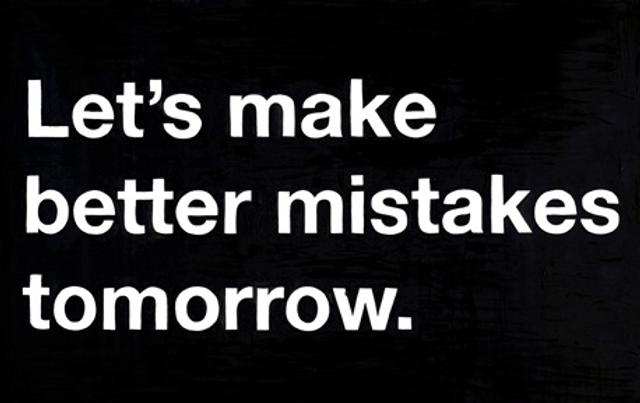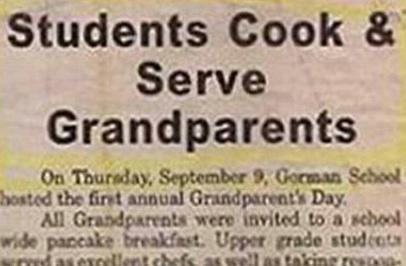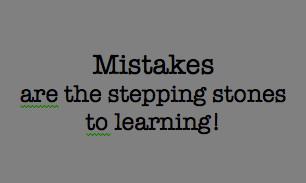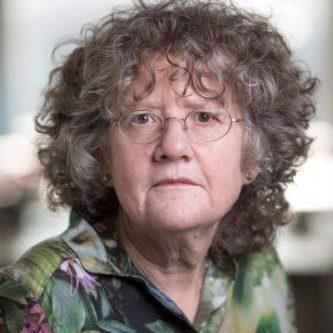My big mistakes – and what I learned
- Written by
- Lyndall Stein
- Added
- June 02, 2012

Well the strange thing about mistakes, is that you can always find new ones to make. I keep thinking that, at my advanced age (don’t spread it around, I already have a ‘freedom pass’), I should have learnt so effectively from my mistakes that I have made all the ones I can and have used up my full lifetime allocation of actual and potential mistakes. Alas, there is always a new sneaky one just waiting round the corner. But, hey, if you spend your life frightened by the next mistake you might make you would just stay at home and, maybe, just stay in bed and sleep your life away.
I have a good friend who is a brain surgeon from Germany and one day I asked him, ‘The rest of us are always saying that it’s good to learn from our mistakes and no one is going to die – we are not brain surgeons. So, Jorn, what do you brain surgeons say?’

‘Well,’ he replied, ‘sometimes we make mistakes, sometimes we learn from our mistake… and sometimes people die.’
That certainly puts my fundraising mistakes into perspective! And it gives me the courage to take a deep breath and share them with you
And to celebrate my six decades – here are six big mistakes and what I learnt from them and, believe me, I’ve got plenty more up my sleeve, but there is only so much public shame a girl can take.
I will start with the years working for the African National Congress – a difficult task in the 1980s when none of us thought Nelson Mandela would ever leave prison. Although we had amazing supporters, we had no equipment, no money for anything, no way to pay designers, consultants or copywriters. Luckily what we did have were amazing volunteers, who wrote and designed newspaper ads and gave us top-class strategic advice.
I own these mistakes but it’s worth remembering that good results take team work and bad results are usually team work as well – nearly always it’s everyone just doing something a little bit wrong, which ends up in a great big mess.
But whatever mistakes we made at the ANC we had one of the best and most compelling cases for support of our lifetime and someone heading the cause who had no opportunity to ‘contaminate his brand’ or spoil his good reputation. There’s not a lot of opportunity for scandalous behaviour when you are locked up in a prison on a windswept island.
Signatory appeal

We had a big full-page ad, which was paid for by our supporters and listed their names as contributors. We had too many for the page and we had to let a few slip off the bottom… How embarrassing then when some while later I went to a job interview at the HIV/AIDS charity the Terrence Higgins Trust, only to discover that my future boss, Daryl Upsall, and his wife, Miryam, had been two of the names who had been dropped off… Luckily he gave me the job anyway and later joined my volunteer team at the ANC, when we brought together a fundraising team for the very first democratic election in South Africa.
What I learnt
The devil is in the detail! Check, check and check again!
Mandela event

The first event we organised was pretty spectacular at one of poshest hotels in the UK, The Dorchester. It was Nelson Mandela’s first visit to the UK after 27 years in prison and everyone was there – ministers, celebrities, business leaders. There were tears, cheers, excitement, emotion, everything you need for a spectacular fundraising success, the only problem was we never really fully briefed him, so he didn’t ask for money. The ANC were so overloaded with work that they didn’t follow through properly so this amazing event did not really bring in much money.
What I learnt
Never forget the importance of the ask. If you don’t ask you don’t get.
Bad data and bad dates
When I went to work at the Terrence Higgins Trust in 1990 times were hard, no effective treatments were available and every day more people became ill, countless died, often slowly and painfully; many staff and volunteers were also badly affected. We were desperate for funds and early on I worked to get a powerful mailing out and a follow-up phone campaign.
The problem was that our data was a mess and one of THT’s volunteers was included in our fundraising programme who was also caring for his very ill boyfriend. He was not at all pleased to receive a phone call asking him for money, which he didn’t have anyway, and made sure to tell everyone what had happened. It was not a lot of fun to be summoned to meet a group of volunteers who proceeded to tell me in very clear terms what they thought of my treatment of, by then, an angry and distressed volunteer.
What I learnt
Dirty data can leave you eating dirt. However dirty data can also be your friend. Just a little later, through a misunderstanding with our data services team, we ended up mailing a large group of supporters who had requested no contact. Of course, we got some complaints but we also got our best ever response and made £15,000, which was a lot of money in those days and badly needed.
Telephone ‘hysteria’
We had a successful television telethon called Hysteria, which included a lot of comedians and performers. In 1993 the income had fallen so we decided to do a telephone campaign to those who had donated to Hysteria explaining that the results were disappointing and how urgent our needs were. Freddy Mercury had just died of HIV/AIDS, which made our appeal even more poignant. The problem was that one of the supporters we rang with the disappointing results was the producer’s father, who told on us. Neither the producer nor the television company who had sponsored the telethon were very impressed with us and some very grumpy letters were soon whizzing around. Despite this, it was a brilliantly successful appeal and brought in a terrific amount of regular givers.
What I learnt
Poor results or disappointing donations can be a platform for very successful appeals if you move quickly and are not afraid of the possible consequences. The value to Terrence Higgins Trust of those thousands of supporters was far higher long term than the bruised egos of a few grumpy television people.
Dealing with donors
One of the biggest foundations in the UK is run by a woman, who I had got to know quite well because she had come to several of my events. Although, she is a very, very wealthy woman – she is probably worth the entire gross domestic product of several countries – she had always been very friendly and courteous to me. One day she phoned me and asked me why I had been complaining about her behind her back…. She was right. I had talked to a funder I had known for many years and it had got back to her. Not a good idea.
What I learnt
You might have a chance to influence funders if you challenge them directly. You are not likely to get a good result from grumbling behind their back and gossiping. The world of big funders is a small one and they talk to each other. I did apologise and I did try to explain that it was difficult to challenge those with power, hmmm… weak excuse! However, she had the good grace to suggest going for a cup of coffee with me. I am not sure I deserved even a cup of coffee.
But the biggest thing I have learnt is, as my old dad says, ‘If you don’t make mistakes, you don’t make!’


















